I'm nonbinary and transmasculine, and I'm considering going on HRT. It's completely in the hypothetical phase right now. I'm still thinking about it. I'm 21, by the way.
My mom is a doctor with some experience in reproductive health. I know she'll support whatever decision I end up making, but I also know she's a little worried that I won't be happy with the effects of testosterone . I'm a little worried too, to be honest. I want my body to be more masculine , but I don't want it to be super-masculine.
I'd really like it if my body was slightly less soft and my voice was a little deeper. I'm pretty sure I want facial hair, but I have some sensory issues, and I'm worried the prickly feeling would bother me.
I'm lucky enough to have a small chest. Certain brands of bra make an A-cup that's slightly too big for me. There's a part of me that's hoping hormones will make my breasts magically disappear, but I know that's not super likely.
I know that testosterone can make acne worse. I already have pretty bad adult acne. On bad days, it really hurts. I'm not sure if I could deal with it being worse.
I guess my question is, how realistic are my goals? Also, there's a lot of fearmongering about detransition. If I decide I don't like the changes to my body, how long do I have before they become more permanent?
I can easily convince myself that going on HRT is a great idea. I can just as easily convince myself that it would be a mistake. Some days I feel really uncomfortable with the feminine parts of my body. Other days I'm fine with my body. How can I tell what I really want?
Howdy, and congratulations on getting this far in your journey! Are we still saying journey now, or has that become a too-corny trans trope? Anyway, congrats on being in the hypothetical figuring-it- out stage!
From your question, it sounds like you've had the start of a discussion with your mom. Congrats on taking that step, which is not always easy, even if you were pretty sure she was going to be mostly supportive. It seems like you're worried about two things: that your mom will be worried about how you feel from the effects of testosterone , and how you will feel about the potential effects of testosterone.
Let's chat about your worries first.
It's normal to be apprehensive about any significant life change, especially one that has potentially irreversible impacts on our body. Although starting on testosterone is certainly not the step off a cliff that some transphobes in the media have made it into being, it's not a small step either. Even folks who have a strong binary , "please may I look as masculine as possible, thanks" orientation to testosterone can have mixed feelings about the decision to start hormone therapy (HT or HRT). For instance, they might be both excited and nervous about changes they will see in their bodies. I don't know if ambivalence is part of all decision-making, but it seems like a small part, at least of many big decisions.
You said you're a little worried about the idea of going on testosterone because you want your body to be masculine but not super masculine. Super masculine could mean a lot of different things for a lot of different folks, but you mentioned some specific changes and specific worries. We'll talk about those a little further down, but perhaps a more general discussion to help frame the whole transmasc HT decision-making process might be helpful for you and other folks who are reading this with similar questions.
When we think about body changes from HT and worries about these body changes, it can be helpful to consider which HT body changes (if any) would be in the "completely unacceptable" category. Information and experience gathering could be helpful at this point. This might be a moment where those hundreds (okay, maybe thousands) of "I'm Eli, and this is my first /second/third month on testosterone" YouTube compilations might come in handy. I don’t say that because masculinizing HT impacts any two people the same, but because watching different transformations might help clarify further what your hopes and fears are about testosterone. If you have nonbinary or other transmasc friends on testosterone (IRL or online), you've probably talked with them about their general testosterone experience, but now you might want to chat with them specifically about any fears or worries they had/are having about the body changes they've been experiencing.
This research might help you understand which body changes are a hard nope, those which are more of a YES! and those which you feel more neutral about.
This information is just the first small step because testosterone is a bit unruly. As you know, once you start taking testosterone, you can't predict which changes will happen first or how quickly any changes will come. You can't even predict how any given body change will look on you. Some people who have gone through masculinizing HT report that their experience looked a lot like their closest cisgender male relatives' puberty process. For example, suppose your hypothetical big brother Joe developed a full beard early in his development. In that case, that might be testosterone's first gift to you, whether you want it or not. But we don't have access to any actual research that confirms how likely this is. I can't even quite imagine what that study would look like.
So, especially for folks like you who want some masculinizing effects but not –as you say–to become "super masculine," testosterone can feel like completing a paint-by-number set with a brush meant for painting the side of a house.
The good news in this specific instance is that even though testosterone is unruly, it also has the courtesy to be flexible. Many of testosterone's body impacts revert to pre-testosterone levels/appearance if a person stops taking testosterone. However, some are permanent:
- Increased hair growth, potentially, everywhere, or at least everywhere humans typically grow hair, so probably not on the bottom of your feet or the palms of your hands.
- A deeper voice
- Growth in the size of the phallus/ clitoris .
- Hair loss on the crown/temples (this doesn't happen to everyone on testosterone, but if it does happen, it's permanent)
A Venn diagram might be helpful to simplify your thought process and decision-making. On the right are the permanent changes from testosterone. The orange circle is for the changes that you are most worried about developing, and the purple circle is for the permanent changes.
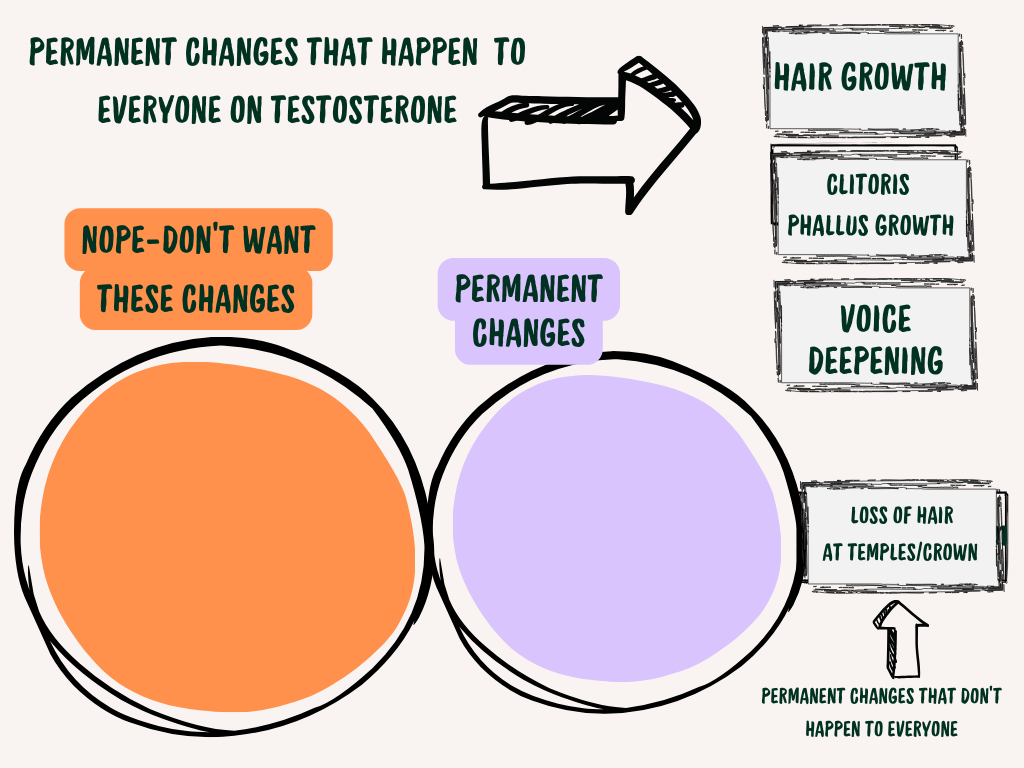
For some people thinking about HT, the changes that are a nope and the permanent changes might overlap; we've represented that "worry zone" in red.
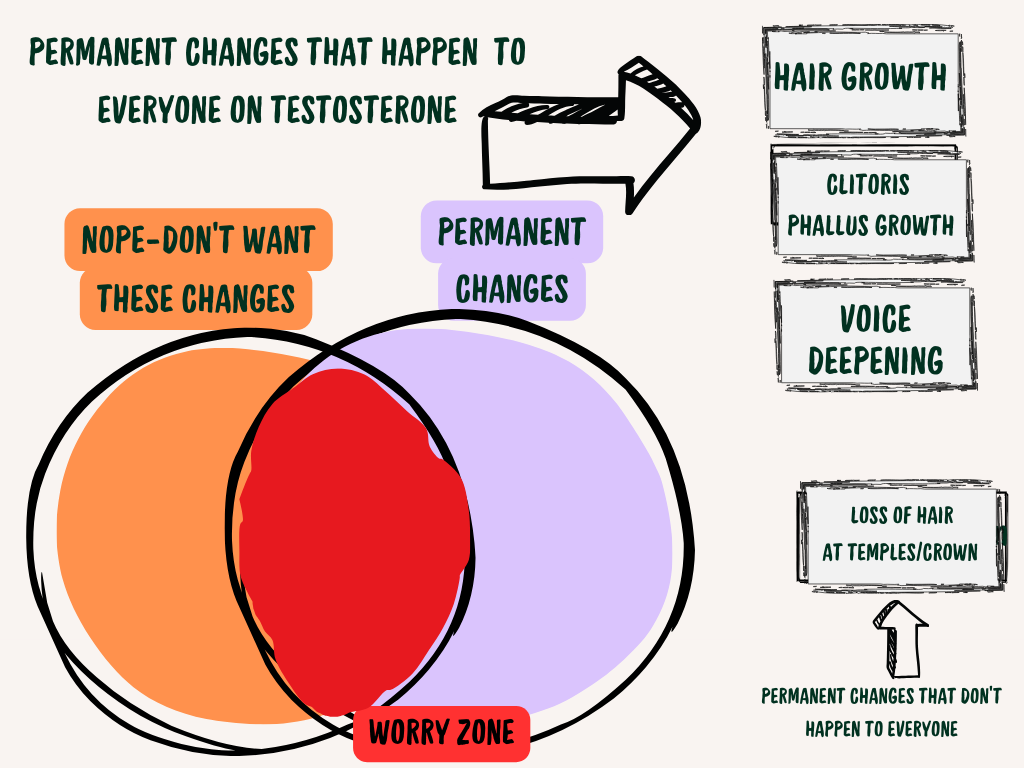
If you were to consider each of the four permanent changes, where would you place them, in purple or red? For example, this could be one potential scenario a person could have: three permanent changes are outside the nope area.
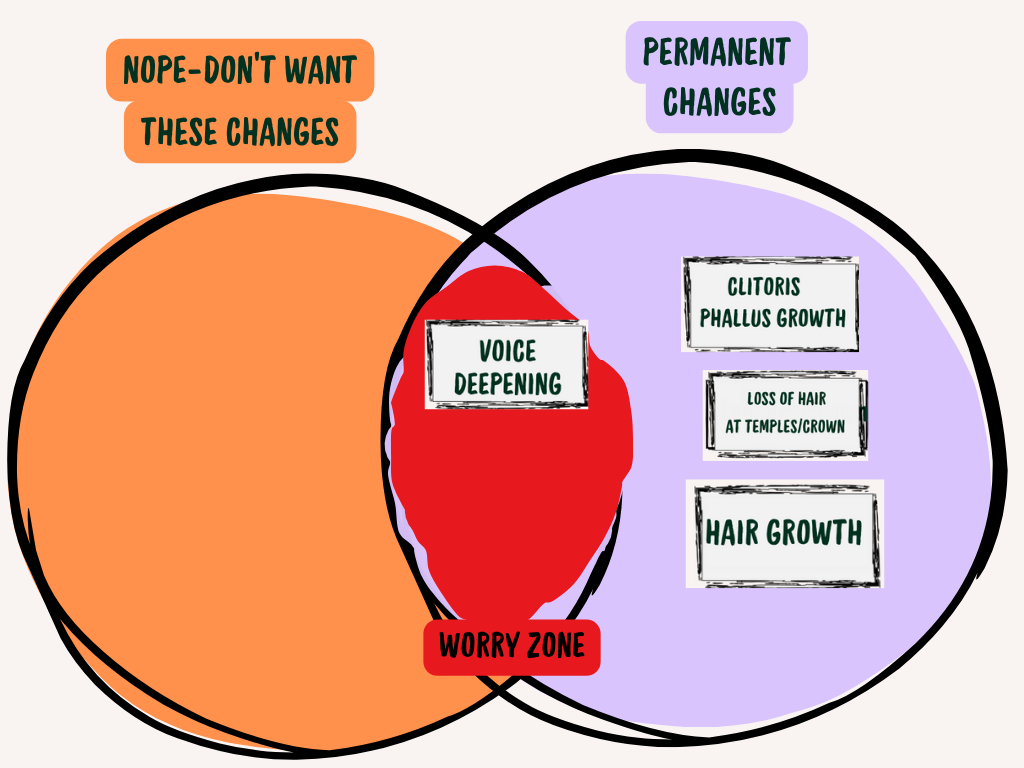
Another scenario: three permanent changes are in the nope area.
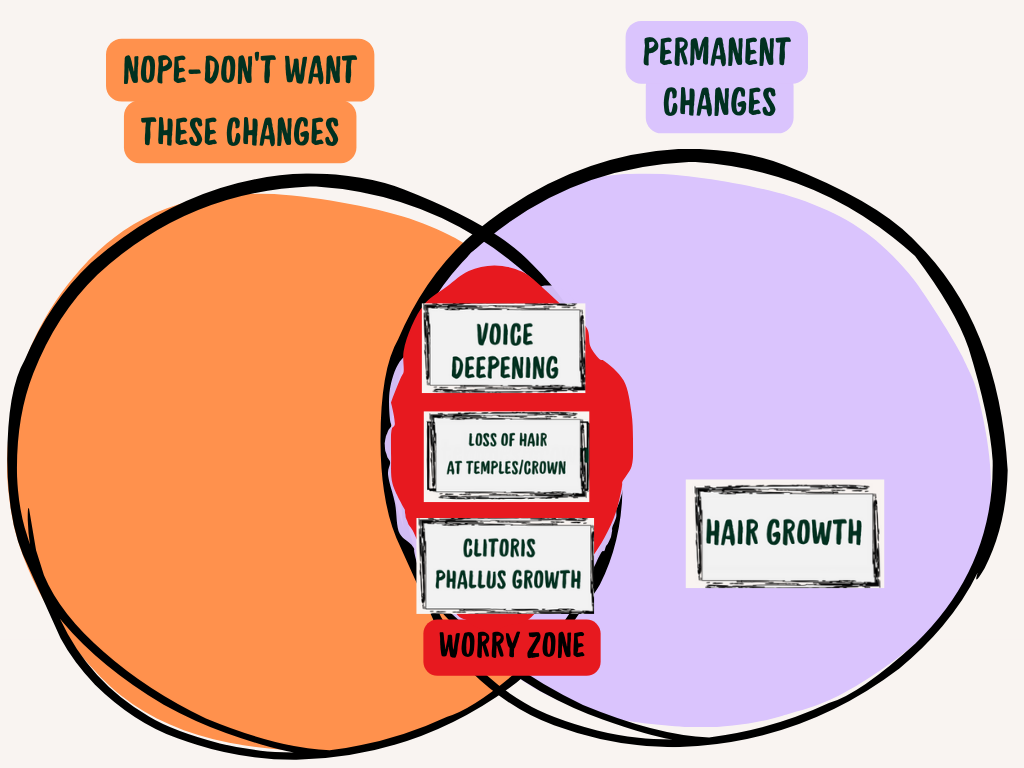
You mentioned voice deepening as something desirable to you, so it sounds like at least that one particular body change wouldn't be in the red zone. You mentioned that you think you'd like facial hair but are also worried about how it would impact you because of sensory issues. So maybe hair growth is on the border of the red zone? It sounds like whether or not facial hair would be acceptable to you depends on the texture of the facial hair as it grows in, and we don't yet know how to predict that in advance. So, depending on how you feel about some of the other changes, your diagram might look this:
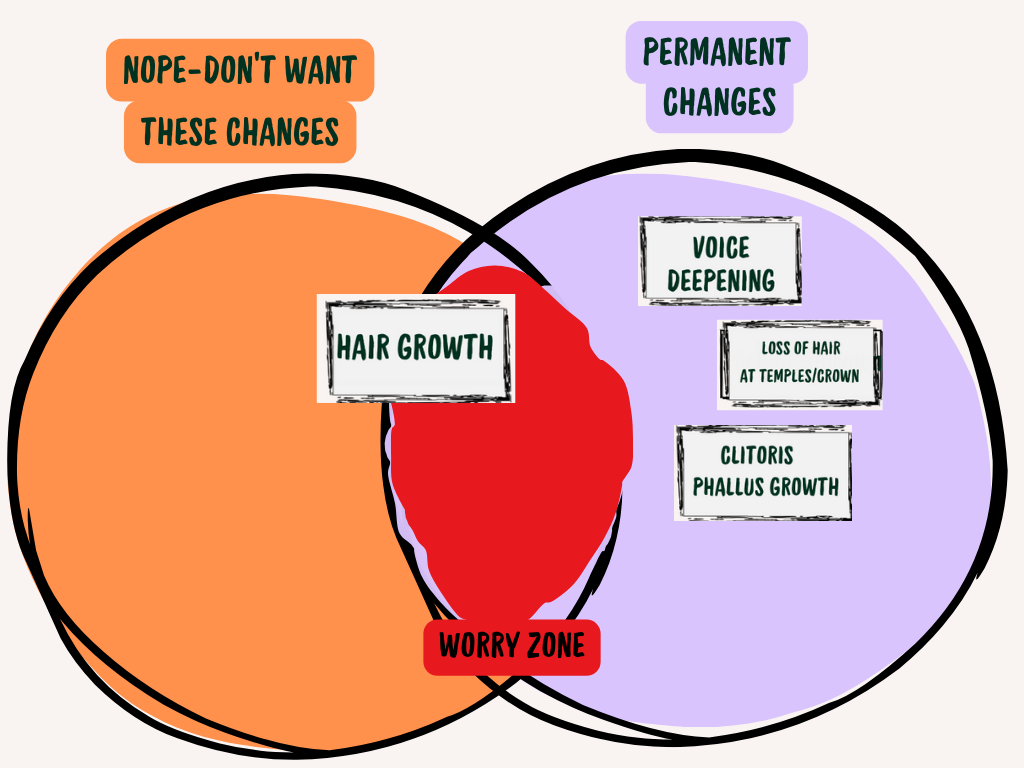
For others folks reading here, more potential scenarios exist, but hopefully, seeing the information in this way produces a more tangible representation of what testosterone impacts might not be entirely desirable but you could live with and which changes you would definitely want to avoid. Having more items in the red zone doesn't suggest you can't or shouldn't start testosterone, but this knowledge can be part of your decision-making process.
For anyone interested in HT but who has items in the red zone, it might be helpful to talk with your provider about starting on a lower dose of testosterone or using a less efficient medium (for example, gel versus shots). Using lower doses or less efficient mediums can cause the changes to happen more slowly, so if you're developing changes in the red zone, you'll have more time to consider if you want to stop HT or slow the process down even more. For you, OP, having the process be slower might help with the worries both about the facial hair sensitivity potential and dealing potentially with worsening acne.
There is little research about HT-related acne, which makes it hard to predict how likely it is that your acne will get worse. For many people on testosterone, HT-related acne gets better after the first year, but it doesn't get better for everybody. If you have access to a knowledgeable dermatologist who can help you develop a game plan, that might be an important part of your decision-making information collection.
You mentioned "hoping hormones will make my breasts magically disappear, but I know that's not super likely," and that seems consistent with most of what we know about how testosterone works. Some people do have a decrease in the actual volume of breast tissue, but the skin that has been filled with this tissue won't snap back into a more masculine chest.
Overall, if this little exercise made you less certain (or if you have general uncertainties), it might be helpful for your decision to consider what you're hoping to address with testosterone. Or, to put it another way, if testosterone is a tool, what are you hoping to build with it? And is there potentially another tool you could use?
You said you'd like for your body to be more masculine, less soft and that you'd like to have a deeper voice and facial hair. Is your goal with these changes addressing dysphoria, hoping that when you look in the mirror, you'll be more content and less uneasy with what you see? Is it about being seen as nonbinary or transmasc? Is it about safety?
Even folks who don't necessarily want to pass as male socially or even transition socially might have safety concerns about being able to use a truck stop bathroom. Testosterone might help with that (it's incredible the chest configurations people can ignore when someone has a beard or a mustache), but there are other ways you can masculinize your appearance and presentation. You might be doing some of these already: wearing layers (although transmasc summers can be brutal), a well-fitted binder (please not ace wraps or athletic tape), having a square haircut instead of one with rounded edges, keeping your eyebrows looking a little messy, wearing a ball cap, and even the proverbial manspreading–sitting with your legs apart. There are also YouTube tutorials on how to apply masculinizing face makeup, and even though that seems a little counterintuitive, at least to me, some of the results they demonstrate are pretty spectacular.
Finally, you mentioned that your mom might be worried about you starting HT and that she would be worried you wouldn't like the impact. Would it make sense to have a discussion with your mom in which you acknowledge the worries she might have and explain what concerns you have as well? If she sees that you're considering all the potential impacts (intended and unintended) to HT, would she be more enthusiastic or at least supportive of your choices?
One advantage of having her on your team is that having a parent in healthcare is potentially quite handy! Depending of course, on where you live and what options there are, perhaps she can help you access a practitioner who has managed low-dose testosterone in the past and is using an informed consent model of care, as opposed to the older gatekeeping model, which requires folks to describe a very binary view of their gender .
Because of how differently people respond to HT, it's hard to label any specific set of HT body change goals as realistic or not realistic. There are as many ways to be trans and nonbinary as there are, well, trans and nonbinary people. Just because you're not 100 percent certain of your choice to start HT or not start HT doesn't mean you're making the wrong decision. It's helpful to talk with healthcare providers and the people who care about us, but ultimately, when it comes to your own body, gender, and process, you're the expert!
